Key takeaways:
- The choice of venue significantly impacts the overall event experience, influencing atmosphere, energy, and participant interaction.
- Sound quality and acoustics are crucial in enhancing live performances, with venue design and equipment playing key roles.
- Capacity and layout considerations, such as unobstructed views and accessibility, contribute to a more enjoyable and inclusive experience for all attendees.
- The venue’s location can enhance the overall experience, with accessibility features ensuring that everyone can participate comfortably.
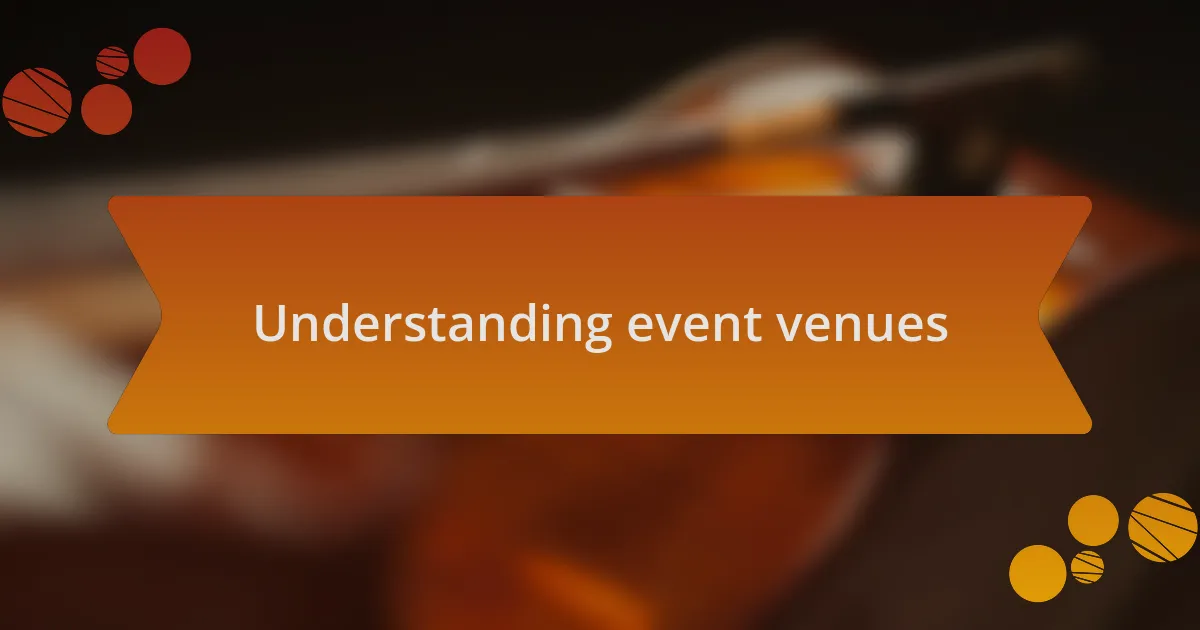
Understanding event venues
When I think about event venues, it strikes me how much they shape the experience for attendees. The atmosphere can elevate a gathering—think of how a vibrant nightclub transforms simply meeting friends into an electrifying celebration. Isn’t it fascinating how the right venue can turn a standard event into a memorable occasion?
I remember attending a music festival in a sprawling outdoor space; the energy was palpable. The layout of the venue played a crucial role—it created a seamless flow from stage to food stands, allowing everyone to mingle easily. This kind of thoughtful design is essential in making an event enjoyable and unforgettable.
Have you ever wandered into a venue that just felt right? It’s in the little details: the lighting, the acoustics, and even the decoration. A well-chosen venue doesn’t just host an event; it enhances it, leaving a lasting impression on everyone involved. That’s the magic of understanding what makes a venue great.
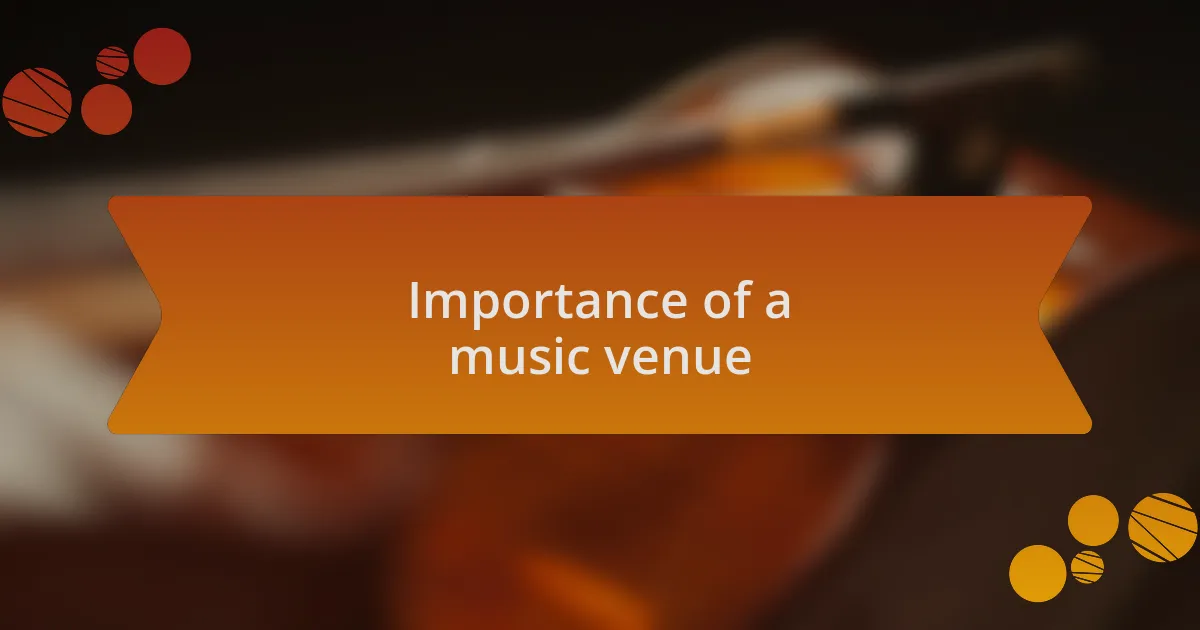
Importance of a music venue
A music venue holds incredible importance because it serves as the backdrop for shared experiences. I recall my first concert at a small, intimate club; the closeness of the audience to the performer made it feel almost personal. It’s in these moments, surrounded by fellow fans, that music transcends mere listening and becomes a binding experience.
The role of a music venue goes beyond just being a space for performances; it can influence the mood and energy of an event significantly. For instance, at a recent show, the venue’s state-of-the-art sound system made every note crisp and powerful, creating an atmosphere that resonated deeply with everyone present. Can you imagine a fantastic band playing in a space with poor acoustics? It would feel like a missed opportunity for connection and joy.
A great music venue is pivotal in fostering community, as it encourages people to gather, interact, and celebrate together. One night, I met so many amazing individuals simply by standing in line for a show. The buzz of conversation around me highlighted how these venues can create a sense of belonging, where music lovers unite over shared passions. Isn’t it incredible how such spaces can breathe life into friendships and memories?
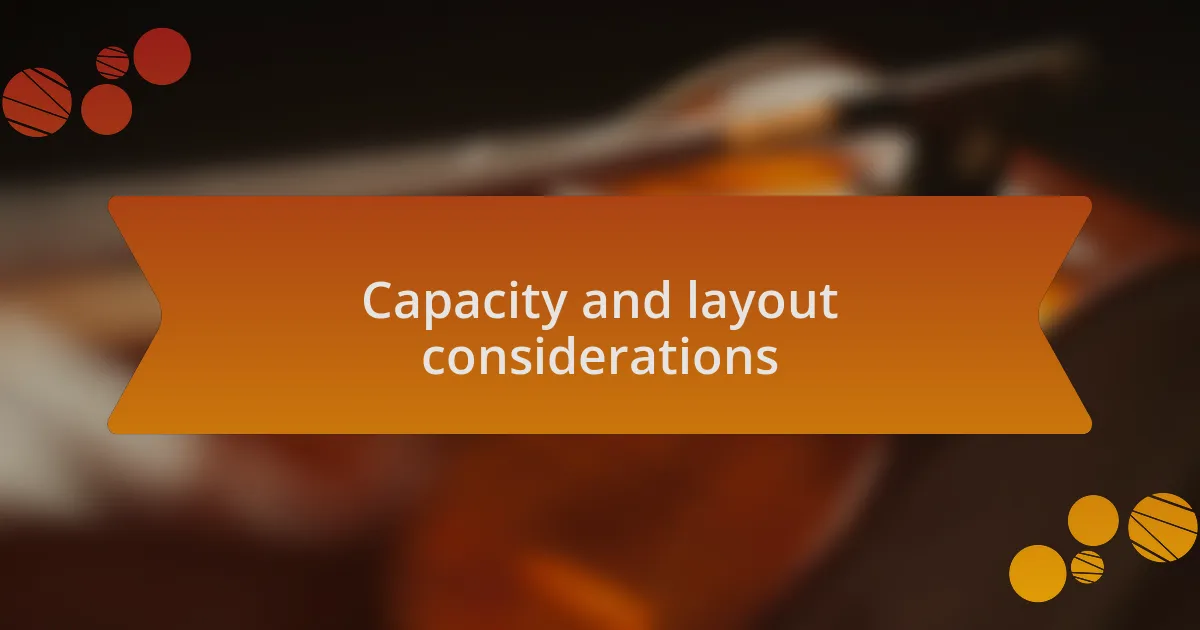
Capacity and layout considerations
When considering capacity, I’ve often found that striking the right balance is essential. A venue that’s too small can lead to overcrowding, while one that’s too large can feel empty, detracting from the energy of the performance. I remember attending a gig where the crowd was perfectly packed; the excitement was palpable, and every cheer felt like it was part of a shared heartbeat. Isn’t it incredible how the size of a venue can amplify the collective experience?
Layout plays a significant role, too. A well-thought-out space allows for unobstructed views and easy movement throughout the venue. At one unforgettable event, the layout encouraged interaction, with cozy corners for conversation paired with energetic dance floors. I’ve realized that a good flow can make a huge difference—when you can seamlessly go from mixing with friends to catching your favorite band up close, it enhances the overall experience.
Lastly, accessibility shouldn’t be overlooked. I’ve been to fantastic venues that prioritized not only the audience’s comfort but also ensured that everyone could enjoy the show, regardless of their needs. It’s heartwarming to see spaces designed for inclusivity; after all, shouldn’t everyone have the chance to share in the joy that live music brings?
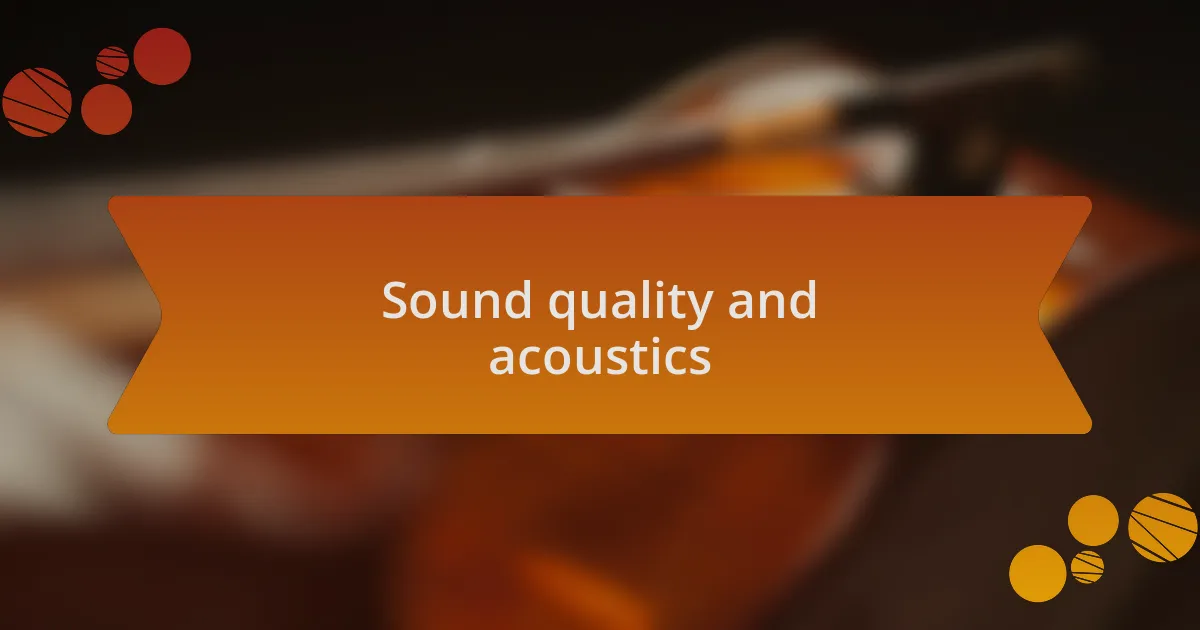
Sound quality and acoustics
Sound quality is a crucial aspect that can make or break an event. I recall one night at a venue where the bass thumped perfectly, enveloping the crowd in sound. It was as if the music coursed through my veins, making every beat a shared pulse of energy. Have you ever experienced a show where the clarity of the vocals elevated the performance, making you feel every lyric?
Acoustics, often overlooked, play a key role in how music is perceived. At a recent concert, I was struck by the way the venue’s design enhanced the natural reverb, adding depth to the sound. It reminded me that a room’s shape and materials can amplify or distort music, turning a simple performance into an unforgettable experience. Isn’t it fascinating how architecture can influence artistic expression right down to the notes we hear?
Lastly, the right sound equipment is essential. I once attended a show where state-of-the-art speakers filled the room, allowing even the most intricate melodies to shine through. It’s moments like these that I cherish, where the quality of sound transforms an ordinary night into something magical. How often do we realize that the technology behind the scenes can create connections that resonate long after the last note fades?
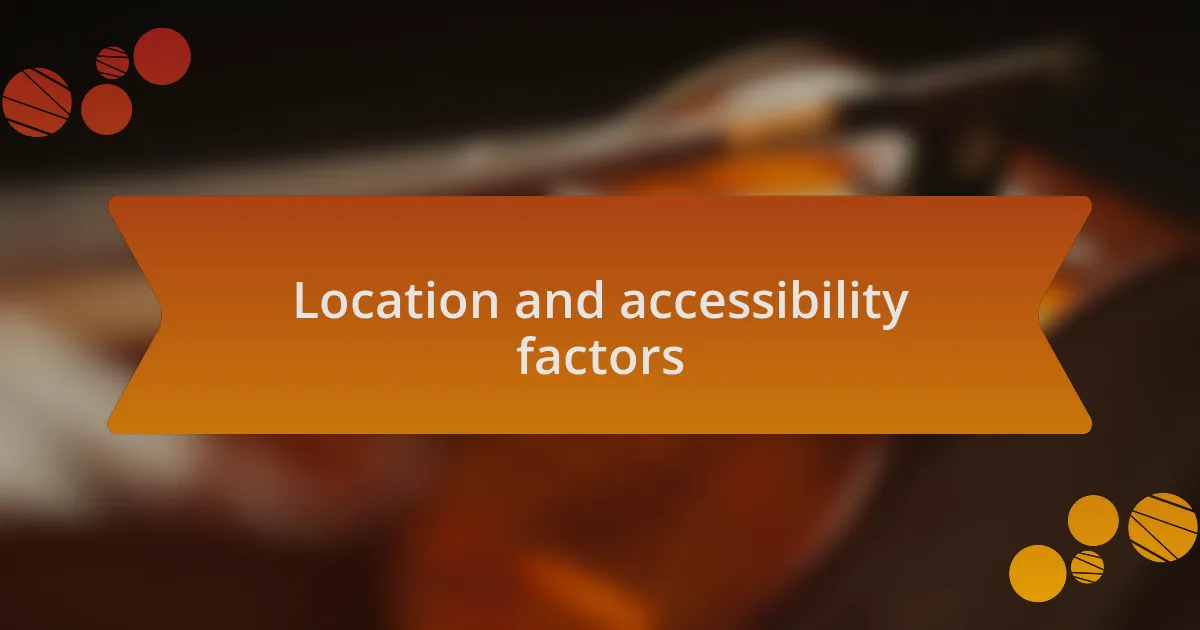
Location and accessibility factors
When considering a venue for events, location and accessibility are paramount. I remember an event I attended that was just a short walk from public transport, making it easy for everyone to arrive without the hassle of driving. Isn’t there something comforting about knowing your night out won’t end in a long, stressful commute?
The venue’s proximity to popular neighborhoods can also enhance the experience. I once went to a club situated amidst bustling restaurants and bars, allowing us to enjoy a meal before diving into the night’s festivities. This layered experience of dining and dancing made the evening feel more complete. How often do those extra moments before a show contribute to the overall vibe of the night?
Accessibility features are crucial, too. I’ve been to venues where thoughtful design made all the difference for attendees with disabilities. Wider entryways, ramps, and clear signage create an inclusive atmosphere, showing that everyone deserves to be part of the celebration. Have you noticed how an inclusive environment can elevate the energy and fun of an event, making everyone feel welcome?